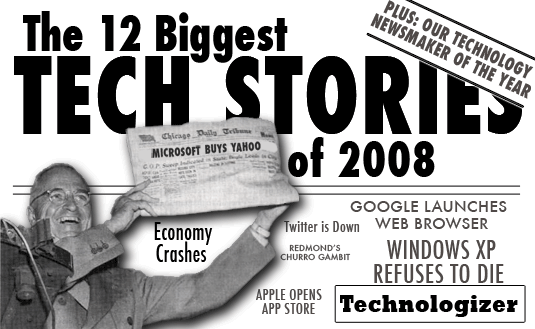 The very first Web site I ever visited was Yahoo. It made enough of an impression that I remember the timeframe almost exactly (early November of 1994). I also remember the search I did, for the comic strip Krazy Kat, and how impressed I was that Yahoo pulled up several dozen Web sites with information on it. (Search for “Krazy Kat” on Yahoo today and you get 1,240,000 results.) Bottom line: I still feel proprietary about Yahoo and feel a twinge of personal distress when when it goes through bad times like its CEO woes and the massive layoffs it’s conducting today.
The very first Web site I ever visited was Yahoo. It made enough of an impression that I remember the timeframe almost exactly (early November of 1994). I also remember the search I did, for the comic strip Krazy Kat, and how impressed I was that Yahoo pulled up several dozen Web sites with information on it. (Search for “Krazy Kat” on Yahoo today and you get 1,240,000 results.) Bottom line: I still feel proprietary about Yahoo and feel a twinge of personal distress when when it goes through bad times like its CEO woes and the massive layoffs it’s conducting today.
I mention this not because it makes me special but because it’s so completely ordinary–for millions of folks, it’s hard to imagine a Web without Yahoo and Yahoo-owned services such as Flickr. I’d love to see Yahoo thrive in the years to come. I call the advice that follows “unsophisticated” because it has nothing to do with issues like the company’s stock price or ad sales strategy or overall financial health. And most of it is probably as painfully obvious as it is sincere. (Much of it, I’m sure, the company is doing right now.) It’s just the earnest, instinctive thoughts of one Yahoo fan–namely me.
So here are ten pieces of advice to Yahoo:
1) Whatever you do, please do your damndest to keep your internal machinations out of the press, once the layoffs are complete and a new CEO is on board? Wouldn’t be it be way better if a typical article or blog post about Yahoo was about a cool new service rather than an embarrassing example of corporate dysfunction? (Yahoo is under such a magnifying glass at the moment that every function looks dysfunctional.)
2) Either sell yourself or large parts of yourself to some other company–Microsoft, AOL, whoever–quickly, or redouble your efforts to stay independent. You can’t talk about “bleeding purple” and be willing to sell yourself to the highest bidder. Choose one path.
3) Right this very minute, do everything in your power to make sure that signature properties such as Yahoo Mail and My Yahoo are relevant, not relics. I like the idea of Yahoo-Mail-as-platform, for instance.
4) Speaking of My Yahoo, make it relevant to sophisticated Web users again. In general, it’s probably a good idea for Yahoo not to robotically follow Google’s lead, but is there any question that My Yahoo circa late 2008 should be a lot more like iGoogle?
5) Make sure that your ability to crank out potentially interesting new services never exceeds your ability to make sure the world knows about them. (For the past few years, you’ve seemingly specialized in launching worthwhile things that fall between the cracks, and you don’t have that luxury anymore.)
6) Make a list of your most intriguing big ideas for Yahoo’s future, then weed it down to the best ten percent. Then kill half of those. Focus on what’s left.
7) Figure out a coherent strategy for what Yahoo means on a mobile phone. Communicate that strategy coherently. (Yahoo Go and Yahoo OneConnect are two different things–I think–but I have trouble remembering which is which.)
8) Create a better, less corporate corporate blog than Yodel Anecdotal (and give it a better name while you’re at it).
9) Don’t ostracize Jerry Yang. He turned out to be the wrong guy to run Yahoo at this particular time in history, but he’s part of your heritage, and it would be cool if he could be part of your future, too.
10) If Yahoo staffers think that the the color purple is synonymous with Yahoo–and they seem to–make sure that Yahoo users do, too. I think the association of Yahoo and purple refers to the color of the company’s headquarters–the purple logo above isn’t the standard one on the Yahoo home page. Isn’t it a little weird for there to be that much of a disconnect between the perception of employees and customers?
Any other unsolicited advice for Yahoo–unsophisticated or otherwise? I’d love to see them flourish forever, and for people to forget that they ever seemed to be in dire straits at all…

 [UPDATE: Now it’s officially offical: Here’s Yahoo’s press release on Bartz’s appointment.]
[UPDATE: Now it’s officially offical: Here’s Yahoo’s press release on Bartz’s appointment.] As I write this, there are slightly fewer than 22.5 hours left to go before 2008 is history. I promise I’ll stop looking back at the year momentarily–I already summed up its
As I write this, there are slightly fewer than 22.5 hours left to go before 2008 is history. I promise I’ll stop looking back at the year momentarily–I already summed up its 

 The very first Web site I ever visited was Yahoo. It made enough of an impression that I remember the timeframe almost exactly (early November of 1994). I also remember the search I did, for the comic strip Krazy Kat, and how impressed I was that Yahoo pulled up several dozen Web sites with information on it. (Search for “Krazy Kat” on Yahoo today and you get
The very first Web site I ever visited was Yahoo. It made enough of an impression that I remember the timeframe almost exactly (early November of 1994). I also remember the search I did, for the comic strip Krazy Kat, and how impressed I was that Yahoo pulled up several dozen Web sites with information on it. (Search for “Krazy Kat” on Yahoo today and you get